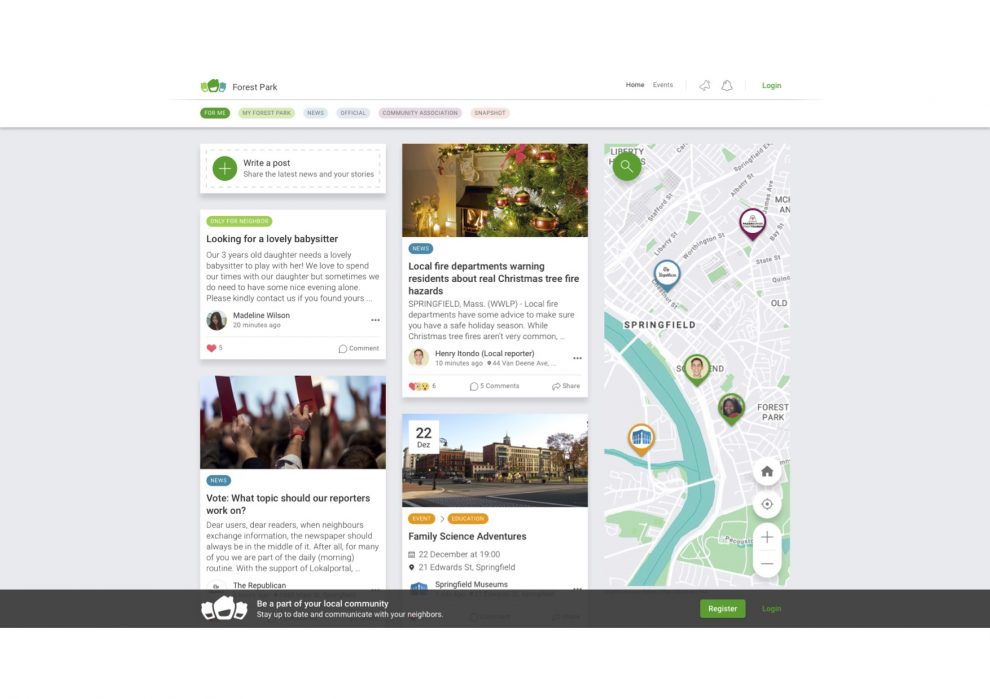
Dog poop and parking spot shortages: just local news things.
These story topics might seem trivial individually but are the core of what matters to local communities — and local news consumers. It’s journalists listening for their questions and getting them answers.
In 2014, Sebastian Penthin cofounded Lokalportal, a startup inspired by his hometown village’s question of what they wanted local life to look like in 2030. At the same time, Neue Westfälische, a German regional daily newspaper in an area with about 2 million residents, was feeling the financial pressures in the newspaper industry, with subscriber numbers and sales steadily dropping.
“We need to create a product of what local communities love and what provides value to them,” Alexander Drößler, a product manager at Neue Westfälische’s online service and Lokalportal liaison, said.
Yes, there are Facebook groups for this — if you don’t mind Facebook controlling your potential for interactions and your data security online. Yes, there is Nextdoor — if you don’t mind nosy neighbors sometimes racial profiling. Yes, there are comments on individual articles within a news site — if you don’t care about having a centralized conversation that’s supplemented by, not tethered to, reporting. So in 2016, Neue Westfälische decided to invest in Lokalportal, starting the process to bring the community information tool to two pilot newsrooms, with a goal to expand to the rest of Neue Westfälische’s target area — covering the 2 million residents — by the end of this year.
“We’re trying to build a hybrid between a local newspaper and a local social network,” Penthin said. “We learned hyperlocal life is more than just the exchange; it’s ‘I want to know what’s going on and perhaps I can participate in it’…We said we need a partner, we need journalists, a hyperlocal newsroom which is the driver of the community.”
This transition made Lokalportal driven by journalism and community connections. The content is split into feeds: “for me,” the specific neighborhood they register to, news, official info (where the reporters and local authorities can share), community groups, and snapshots (a photo-sharing feed like Instagram), which converge in the main feed.
Lokalportal also screens participants geographically — while Facebook had folks do that for political advertising, Lokalportal requires a verification process via SMS or mail if anyone wants to post or engage with posts, blurring out the other neighbor-submitted content if the user is not verified. “Even if they’re arguing, they find the right words. I guess it helps that our users must use their real names and real addresses,” said Lena Krause, one of Neue Westfälische’s reporters piloting Lokalportal.Krause is one of five reporters and editors publishing to and moderating Lokalportal in its two pilots, launched in early 2017 and 2018 in the towns of Paderborn and Bünde. She organizes in-person meetups in Paderborn and puts out surveys to ask the community about their wishes and needs for the neighborhood, like the parking spot shortage: “A lot of people left a comment under this survey, that they would really love having more parking spots. So, I met with the person in charge of the city council and discussed the issue with him, wrote an article about it to inform the community and finally helped start a team with community members, members of the city council, and a local social organization to try and fulfill the communities’ need for more parking space.”
Yes, keeping up with another platform is another box to check for some, but it’s also a direct line to readers who actually care about the work and their area.
Stefan Boscher, the editorial director of the pilot in Bünde, told me about a “55-year-old man who was recently happy to finally be able to use a social network. When I asked why this was new to him, he replied: I do not want to stay in touch with avoidable contacts in Dubai or London. I want to know who lives in my neighborhood and wants to get to know these people.”
Most of the users are between 25 and 50, with an average age of 35, Drößler said. Lokalportal has brought 20,000 users out of the target group of 180,000 to the site, with 10,000 registered.
And of course, the business model: Like other hyperlocal news models, Lokalportal is emphasizing advertising relationships with local small businesses, especially those with a media budget of 100-500 euros a month, Penthin said. “They miss an opportunity to advertise in the newspaper where you don’t get people between age 25 and 35 or the region was to big and Facebook and Google was too complicated,” he said.
Neue Westfälische pushes a paid content strategy, but Lokalportal isn’t yet looking for reader revenue. The relationships Penthin, Krause, and Boscher talked about are similar to those highlighted in membership programs but Penthin said it’s too early to pursue.
“We need to think about the kind of journalism we do on the platform and how we can use the platform and stakeholders on the platform to create more meaningful journalism for the members,” Drößler said.